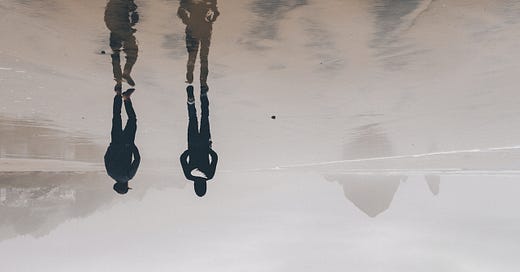Who is your future self?
How choosing to do the work will define who you will be
Last week, one of my clients said this to me:
“Oh, I don’t know what to work on today; I don’t think I have anything to get coached on.”
A hopefully discreet smile crept up on my face, perhaps because I’ve said the exact same thing or thought as much in the past. When someone is unsure what topic to focus on, I look for the ‘area of least satisfaction’ and proceed from there.
“There is always something we can get coached on. And there are plenty of tools I can suggest for you to try out if you’d like,” I responded, excited about the thought of using a few of my coaching tools with him.
Said client, feeling my enthusiasm despite the lack of an immediate objective, looked relieved before suggesting: “You should talk about this in your next blog post, I bet most people have no idea they can rock up without a topic.”
Looking back, and fresh (or rather not so fresh) after a PT and tennis session myself, I still feel amused by the original comment. We are such strange creatures. We know so much and yet we know so little.
Would you ever go to your personal trainer or piano teacher (or whatever is applicable for you) and say: I don’t have anything to work on? Of course, it’s much easier to see and feel the where and how we need to get better at physical or creative training - our body or the results from the training are perhaps more tangible. They’re there for us to feel, observe (and often criticise).
But is it me or do we try harder to be our best in these external pursuits like sport, career, or creative skills than we do in other parts of our life, such as in our relationships? Do we try to please or appease other people’s perceptions of ourselves?
I learned to play the piano, and later sing, by playing an hour a day, sometimes more, for years. I wonder what could happen if I put the same consistent effort into developing my soft skills. Oh wait, I am! I’m a coach in training and meditation teacher. I wish I’d come to this earlier in my life, though. I always had a bit of a cocky attitude (despite the pervasive impostor syndrome lurking in the background), walking around most of the time thinking: “I’m good, I’ve got this. I have totally got this.”
Our minds (I’m thinking it’s not just me) are clouded by self-assured thoughts, playing these tricks on us. These thoughts obscure a widely understood wisdom that is:
There is always something for us to learn.
There is always something to be practised, enhanced, or refined.
This makes me think that I’ve probably being going around most of my life not realising I was caught in ‘unconscious incompetence,’ the first of the four stages of learning.
Even during these times, when we know what we’re doing, resting on our laurels rarely serves us because change is always near. There is always something for us to work on.
Sometimes it’s subtle, delicate work on symbols, metaphors, or body tuning (hint - coming up this Friday in our Work, Together sessions).
Other times, when things are ticking over pretty well, we can choose to tackle the smallest-seeming problem. It could be something as trivial as changing a habit, like getting up at a particular time, moving forward with a project, getting work done (procrastination is everywhere) or working on self-care. Just a few moments of inner inquiry and coaching practice can bring us to earth-shattering breakthroughs.
We’re only as good as the work we do today, the attitude we have this morning, the presence we bring to this next meeting or the quality of interaction we have with each other.
You could also say: we’re only as good as the level of effort and the intention we invest in being our best selves. This requires daily practice, a good dose of self-awareness and is probably more important than refining our swing, scales, lifts, or whatever else we are consciously trying to get better at.
And here’s something to anchor this in; an excerpt from a recent article by Benjamin Hardy in the Harvard Business Review:
[…]. Research shows that both motivation and hope stem from the combination of a clear, desired outcome, the belief that you can succeed, and a path to get there.
The burgeoning field of positive psychology has flipped many old assumptions, finding that humans are not driven solely by their pasts, but rather are actually drawn forward by their own views of the future — a concept psychologists refer to as prospection.
[…]Your future self is not someone you discover, but someone you decide to be.”
Here’s something for you to chew on:
Do you know what you want?
Do you know how to get there?
And more importantly, do you know what kind of person you want to be?
If you need help with any of the above, feel free to get in touch.




